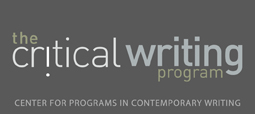Professor Jeffrey Kallberg

About the Professor
Professor Jeffrey Kallberg received his Ph.D. from the University of Chicago in 1982 and is now a Professor of Music and Associate Dean for Arts and Letters for the School of Arts and Sciences at the University of Pennsylvania. Professor Kallberg's sub-discipline within the field of music is Music History, with his area of speciality being music from late 18th century to early 20th century. More specifically, he deals a lot with the work of composer Frederic Chopin. For more biographical information: See Penn's Music Department website.
Writing Tips from the Professor
According to Professor Kallberg, the most common problem is getting students to think on how to support a point and "what counts as evidence." This is mainly a problem of omission, where students just leave the evidence out.
Students also have difficulty appropriately incorporating sound as evidence. They have trouble finding the right vocabulary for their intended audience. In classes intended for majors or for graduate students, who are writing to a more professional audience, more technical vocabulary may be necessary.
Finally, students sometimes struggle when using metaphors to describe music. As Professor Kallberg explained, "On a fundamental level, there is no way to write about sound without the use of metaphors. This proves to be a challenge with students in getting them to realize that using this kind of language is something important, and not something to be embarrassed about."
Rankings
When asked to rank the criteria below in order of importance in a student's writing assignment, Professor Kallberg ranked them as follows:
1. reasoning and evidence
2. organization
3. having original ideas
4. demonstrating mastery of other's ideas
1. grammar and mechanics
1. style
1. following the assignment instructions
2. following the discipline's citation practices
2. proper formatting (font, margins, etc.)
*Note: All 1's are equal in importance, and the criteria given 2's are least important.
Between the two groups, Professor Kallberg considers the first group more important than the second. However, he weighs in all when calculating grades. Interestingly, he has found that students with problems in one category often have problems in the other.
Personal Writing Process
Professor Kallberg's writing process differs depending on what kind of writing he is doing. In general, he uses some kind of note-taking system, whether on paper, on the computer, or with some note-taking tool. He does some pre-writing (like creating an outline) where he considers (1) audience - who he is writing for, (2) word limits, and what he can can express within those limits, and (3) his main points and how he plans to support them. After he writes, Professor Kallberg describes himself as a "compulsive reviser." Whenever he comes back to his paper after being away from it, the first thing he does is read it over again and revise. For his more substantial written works, he has a few trusted friends peer review his writing.
Favorite Authors
When asked who does he regard as the greatest writer in his field, Professor Kallberg noted a fellow Penn professor, Carolyn Abbate. He also named Charles Rosen, who is a pianist and writer on music. Professor Kallberg also recommended that students read Jeremy Denk's online blog, think denk. This is a good resource for students seeking to learn by example how to write in the discipline of music.
The Professor's Writing
Professor Kallberg's writing in the discipline of music consists of books, articles, conference paper presentations, program essays for CDs, and program notes for concerts.© 2013 The University of Pennsylvania
